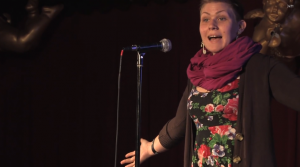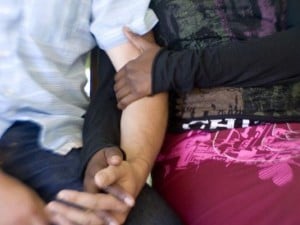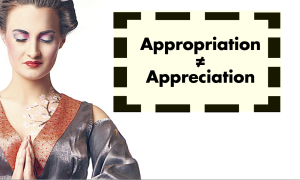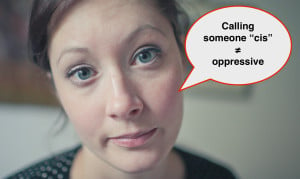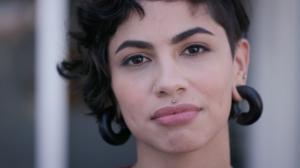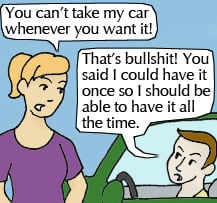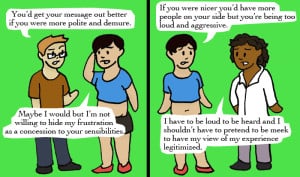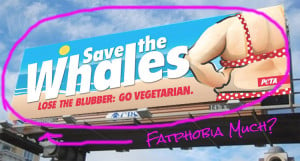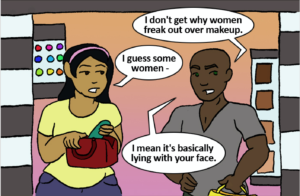
A person gives a thumb down, looking peeved.
Originally published on The Body Is Not an Apology and republished here with their permission.
I am mixed race.
There are many ways to be mixed race. The dictionary defines it as people whose parents or ancestors are from different ethnic backgrounds, but the definition can vary based on context.
For the most part, mixed people have the right to define their own identity and their relationships with their varied ancestry, but the mixed identity is a fraught one, drawing on narratives of privilege, oppression, and fetishization that can vary for each individual.
Mixed white European people have claim to their distinct ancestries and their complexities, for example, but are not necessarily people of color, and thus don’t face the same discrimination. Afro-Latinx people may or may not consider themselves mixed, depending on their background and context.
Barack Obama’s relationship with his mixed identity may fill volumes that I do not have the authority to write. But he is still largely recognized as the first Black president, while also being simultaneously derided for being too Black and critiqued for not being Black enough.
I happen to be mixed with white – Pilipinx mixed with Eastern European Jewish – but despite popular belief and stereotype, not all mixed race people are mixed with white. Navigating a mixed race identity can be hard enough on its own, without detrimental comments.
We have to confront our own experiences of belonging and non-belonging, of feeling like lesser, neither, or downright nothing. We have to confront how our very existence can be the product of colonialism and colorism – or how we can exist in stark defiance of those ills.
We have to confront living with different disenfranchisements at once, in different contexts.
Living as a mixed person of color is a fraught, complex, sometimes painful, and sometimes beautiful experience. You can read about mine here, but today I want to address common misconceptions, misperceptions, microaggressions, and outright oppressions that we mixed race people face.
Don’t misunderstand – I am diluting consistent oppression and marginalization into a listicle. I do this for accessibility, to illuminate the toxicity behind rhetoric people often perceive as harmless or positive, and to use these phrase as jumping off points towards a fuller understanding of mixed race identity.
There’s much more at work here, and people who are not mixed need to check not only their use of these phrases, but the mindsets behind them.
Many inappropriate and harmful comments aren’t made by open racists – though their presence is real and dangerous – but by well-meaning people who deign themselves “allies.”
Depending on who says it (a white person, a person who is fully one of the races with which you’re mixed), it can be worsened. But regardless, each is charged with its own implications, assumptions, and power dynamics.
The intricacies of race, perception, and oppression can vary for every mixed person’s experience. To be a good ally, don’t assume you’re coming from a good place. Understand that because systemic prejudice and anti-miscegenation laws have structured our society, confronting internalized racism is a process of conscious, humble undoing.
Let me go through a few common ridiculous things you should absolutely stop saying to mixed race people.
1. ‘What Are You?’
We know where this is coming from; mixed race people don’t necessarily look like what you might “assume.”
People make assumptions when they’ve met one parent or the other, when they hear my last name, when they hear my voice, when they see my face.
Often, this is spoken in almost a hushed tone, as if we are sharing an inside joke. As if they are in on the secret. As if they are trying to set themselves apart from the brash, the crude, the Mean Girls Karen Smith manifestation of ignorance – the “If you’re from Africa, why are you white?”
It’s weighted with an implicit acknowledgement, which we as mixed people are supposed to be… happy about? I see you, they’re saying, I know you’re not like the rest. I can tell.
Not only is it really none of your business, given our climates of colorism and white supremacy, but this can come across as fetishizing at best and threatening at worst.
Besides, I am not a “what.” Neither is my mixed identity. I am an individual who contains multitudes, and I don’t appreciate your attempt to box me into one set of stereotypes or another.
So yeah, sure, it can be fine to ask. Sometimes you should know where your friends or coworkers are from, so you can respect them.
Some of us want other people to know the narratives we carry. But that’s up to us. Mixed race people don’t owe you an answer.
Our identities are not curiosities, small talk, talking points, or tokens. You don’t know what our backgrounds mean to us.
Approach us with some deference. Acknowledge that your question is charged, and that you may be coming from a place of privilege.
Do not pretend you’re in on the secret just because you made an assumption. Do not assume this question has an easy answer or that it will be the answer you’re expecting.
We defy expectation. We don’t owe you anything.
2. ‘That’s So Cool!’
Sigh.
Okay, I know, sometimes it is. I am simultaneity, I am the intertwining of two incredible, disparate cultures. Oceans have crossed within me; rhythmic island dialects and heady Canaanite rhythms live not quite at home together on my tongue.
It took me 22 years to begin to see that though, and I’m still working on it – and it’s entirely mine. Every day, I confront non-belonging, alienation, and racism.
My physical existence: my face, my hair, my skin color. My body won’t let me forget.
I am working on celebrating my existence in this place of multitudes, intersections, and growth. I am working on this despite the pain and setbacks I face.
Don’t glance at what you don’t understand and reduce it to “cool.”
More importantly, when full race people say this to mixed race people, it’s a reinforcement of the unbalanced power dynamic.
Who are you to come down from your stable identity and patronizingly “validate” me? Ask yourself why you’re curious about the racial background of mixed race people. We are not a curiosity.
3. ‘That’s So Hot!’
A more obvious extension of the above, this is fetishizing based on stereotype.
This is not a compliment. I don’t exist to intrigue you.
Ultimately, this sentiment reflects some pretty nauseating exoticization and anti-Blackness. Exoticization is a manifestation of white supremacy designating something as “other,” but non-threatening; unfamiliar, but tamable; bizarre, but seductive, seductive in its bizarreness.
When it comes to mixed people, this can be uniquely disgusting.
I’m mixed Asian and white – thus foreign enough to be perceived as noticeably “different” – but with white enough features that I’m still considered attractive, harmless, and civilized by Western standards.
I don’t look very obviously Filipina, so my perceived attractiveness remains “approachable,” and my skin’s light enough that misogynist stereotypes of Asian docility and subservience manifest in how Western men see me.
This means I have the privilege of not being perceived as the hypersexualized, disgustingly racist misperception of a dark-skinned woman, laden with stereotypes of alluring, “savage” eroticism.
This is consistent with our society’s colorism, which means “prejudice or discrimination against individuals with a dark skin tone.”
Historically, the Western world has constructed the narrative that darker implies lesser: poorer, given to be laborers, less civilized, less intelligent, less beautiful, more prone to “deviant” sexuality and aggression.
This is a manifestation of white supremacy, and it needs to be recognized and culled. When you call a mixed Black person of color “hot” because they are not fully Black, you are degrading and oppressing their Blackness while disrespecting the intricacies of their identity.
This manifests for many people of color who are mixed Black – being “less” Black, but “enough” to make them an attractive novelty, as if complex racial backgrounds can be reduced to socially-constructed fuckability as perceived by the Western male gaze.
This is invalidating, racist, colorist, anti-Black, and not “hot.”
Mixed people don’t exist to turn you on. You shouldn’t be attracted to racial and racist stereotypes.
Recognize your position as one of privilege, as a potential colonizer, when you register your attraction to mixed people, especially mixed Black people of color.
Do not perpetuate toxic, dangerous exoticization. If you think I’m attractive, recognize me as an individual. Respect the complexities of my identity.
Do not reduce us to how and how badly you want to fuck us. We each belong to ourselves.
4. ‘Everyone Will Be More Like You One Day’
This is a weird and annoying neoliberal, white feminist one.
I agree: Hopefully, as we become more and more outspoken about racism, colorism, colonialism, and white supremacy, we will allow for more celebrated love across races. Yet miscegenation, or intermarriage or sexual/romantic relationships between races, was not decriminalized in the United States until 1967 (and until more recently across the world).
Indeed, there was plenty of “intermixing” between white and Black folks during slavery and the Jim Crow era –and not only did that not lessen racism in the US, it helped to solidify it.
Miscegenation was often enacted under sexual violence and the violation of Black women, and led to the lynchings of many Black men. Conceptions of racial purity and white superiority still govern how people are perceived desirable, or even just valid.
Colorism is tied into classism and racism. Darker peoples are believed to be poorer and less attractive. When my parents met, they faced legal and societal discrimination, as do many mixed race couples.
Please don’t speak with patronizing authority about what you barely understand. And again, this goes back to the problems of “That’s so cool.”
The other issue here is “melting pot” ideology. The melting pot imagines that all cultures can not only coexist, but also borrow from each other indiscriminately, and blend together into a colorblind mush.
I can’t speak for all mixed people and people of color, but largely, this idea is damaging. We don’t want you to borrow from us without understanding us – that’s cultural appropriation. We don’t want you to divorce us from our unique, distinct cultures. That’s erasure.
Colorblindness is racism. Often, when people say they don’t see color, what they mean is they only see the absence of it: whiteness as the default.
This doesn’t help us. We want to coexist. We don’t want “separate but equal,” but we don’t want to dilute our identities into colorless chaos divorced from context and history, either.
We want to take down power structures that invalidate us and render us inferior. We want to be recognized.
You are not like us. I don’t care if you think yoga’s really great for your back, sushi’s delicious, and rap music’s the best – you don’t have a claim on other cultures, and it’s not at all cool to tell mixed people that just because we access multiple cultures, you think you’re entitled to the same.
5. ‘I Knew I Saw Some _____ in You!’
You didn’t. You really didn’t. Don’t search our mixed features for familiar stereotypes.
Don’t try to break my nose down into Filipina-wide, Jewish-bulging; my eyes into half-slanted, half-wide; my hair into Asian-thick, Jewish-frizzy.
We mixed race people know ourselves, our bodies. Sometimes we love to celebrate where features come from, how different histories play upon the landscape of our physicality or our values, but that’s because we live it.
Don’t reduce me to a set of physical archetypes. I am not a puzzle you can spend your afternoon piecing together.
We don’t exist for you. We don’t have to be broken down into our composite parts, our distinct races, to be valid.
We are simultaneity; we are those features existing in a living body and soul.
We’re not halves of anything, but full and intricate individuals.
Allow us to own ourselves.
6. ‘You’re Not Really _____’
The offensive parallel to #5, when we don’t “look” or “behave” mixed enough for you.
Mixed race people may face this when we identify with a race with which we’re mixed.
I’m Pilipinx, but I don’t speak my family’s Tagalog fluently. This is because of colonialism, assimilation, and my family’s specific struggles and experiences in this country.
This does not invalidate my identity as a mixed Pilipinx individual. Every mixed individual has their own relationship with the cultures they come from.
It is not up to you to tell us we don’t belong.
7. ‘I Can’t Even Tell!’
And here’s that benevolent, insidious racism again: #6, but presented as flattering.
You think we want to hear this? It’s not a compliment to erase an aspect of our identity. It’s invalidating.
When we don’t conform to your assumptions about what mixed people look or behave like, that’s not our problem – it’s yours.
Mixed identities are layered and complex. Even if you mean well, you may be holding onto ideas based in racism, colorism, and white supremacy.
Take the lead from your mixed race friends. Don’t expect us to hold your hand and spell out how to treat us like people, but take the initiative to be humble, to listen to how we speak about ourselves, our relationship with our identities, and how we want to be perceived.
Remember that each mixed person is unique, and none of us owe you anything.
And to my fellow mixed humans out there: We are valid. We belong to us.
Our identities are our own. We belong. We don’t need to be any more or less.
We are not disparate fragments of individual cultures – we are each something else entirely, and our experiences are important, fraught, and damn beautiful.
Your body, mind, and soul are allowed to overlap between cultures, landscape, and language.
We are multitudes. May each of our journeys with our identities endeavor towards love and learning.
***
To learn more about this topic, check out:
- 4 Ways Parents Can Support Their Mixed Race Children
- 5 Things I’m Tired of Hearing as a Mixed-Race Latina
- What Nobody Who Says Talking About Race ‘Divides’ Us Seems to Understand
[do_widget id=’text-101′]
Maya Gittelman is a queer, mixed Eastern European Jewish and Pilipinx individual. She was an English major, loves writing, and spends much of her time emoting about intersectional representation in the cultural canon, as well as contemporary media. She is passionate about radical self love, justice, accessibility, radical and intersectional education, and representing issues that matter by highlighting the voices with authority. Follow her on Facebook and Twitter @mayagittelman.
Search our 3000+ articles!
Read our articles about:
Our online racial justice training
Used by hundreds of universities, non-profits, and businesses.
Click to learn more








